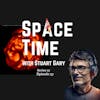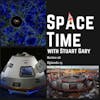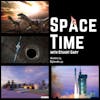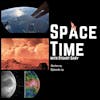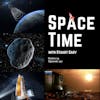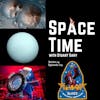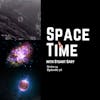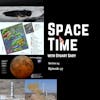46: New clues as to why matter dominates over antimatter

The Astronomy and Space Science News podcast
Stream Episodes on demand from www.bitesz.com or www.spacetimewithstuartgary.com (both mobile friendly)
* New clues as to why matter dominates over antimatter Scientists have found evidence for a weak preference for matter over antimatter. While the discovery is far too small to provide any real proof of an imbalance between the way matter and antimatter act, it might provide the first tantalizing clues of some new physics beyond the Standard Model -- to explain why the universe appears to be made up mostly of matter -- rather than antimatter.
*Detecting new types of gravitational waves A team of astrophysicists have proposed that permanent scars left in the fabric of SpaceTime by gravitational waves could be used to study exotic hypothetical cosmic events such as primordial black holes and one-dimensional defects in space known as cosmic strings. The study identifies a new concept which the authors are calling orphan memory.
*Cassini finds Saturn’s moon might have been tipped over Saturn’s ice moon Enceladus may have been knocked onto its side in an ancient collision early in its history. The new findings are based on observations by NASA’s Cassini spacecraft which found evidence that the moon’s spin axis -- the line through the north and south poles -- has reoriented, possibly due to a collision with a smaller body, such as an asteroid.
*New discovered planet hotter than most stars Astronomers have found a Jupiter sized exoplanet hotter than the surface of most stars. A report in the journal Nature indicates that the planet KELT-9b has a day side surface temperature of 4,600 Kelvin – only 1200 degrees cooler than the surface of the Sun.
*Expedition 51 return to Earth The two man Expedition 51 crew from the International Space Station have returned safely to Earth aboard their Soyuz MS-03 capsule. Their spacecraft undocked 3 hours and 20 minutes before touchdown as the orbiting outpost flew at 28 thousand kilometres per hour 400 kilometres above the Mongolian-Chinese border.
If you're enjoying SpaceTime, please help out by sharing and telling your friends. The best recommendation I can get is one from you. Thank you...
#astronomy #space #science #technology #news #astrophysics #NASA
Learn more about your ad choices. Visit megaphone.fm/adchoices
Support this show http://supporter.acast.com/spacetime.
See acast.com/privacy for privacy and opt-out information.
The Astronomy, Space, Technology & Science News Podcast.
New to SpaceTime with Stuart Gary?
Here are some great episodes to start with.







































